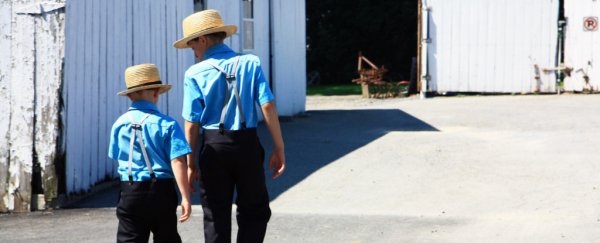For the first time, scientists have found a genetic mutation that appears to offer a measure of protection against some of the biological effects of ageing.
And, as far as we know, it looks like the only community in the world known to harbour it is an Old Order Amish community living in Indiana.
The mutation can occur on one or both copies of a gene called SERPINE1. It's known that when both gene copies are mutated, it can lead to a rare genetic bleeding disorder - and the Amish community in question is susceptible to it.
This is how they came to the attention of Douglas Vaughan, a medical researcher at Northwestern University, and it's also why the members of the community were willing to participate in the research - all parties wanted to know more about it.
The bleeding disorder occurs because SERPINE1 is responsible for regulating a protein called PAI-1, which helps dissolve blood clots.
But when only one of the gene copies carries the mutation, it seems to confer several interesting benefits.
Vaughan's team tested 177 people from the Amish community of Berne, Indiana, and found 43 people with one mutated SERPINE1 gene copy.
Compared to the general Amish population, these 43 people had a 10 percent longer lifespan, and 10 percent longer telomeres (the DNA-protecting structures at the ends of our chromosomes that unravel when the cells reach the end of their lifespans).
They also showed lower incidence of diabetes and lower insulin fasting levels. On top of that, the study showed a small indication of lower blood pressure and potentially more flexible blood vessels.
"For the first time we are seeing a molecular marker of aging (telomere length), a metabolic marker of aging (fasting insulin levels) and a cardiovascular marker of aging (blood pressure and blood vessel stiffness) all tracking in the same direction in that these individuals were generally protected from age-related changes," said Vaughan.
These people also had 50 percent lower PAI-1 levels than average.

It's not known exactly how PAI-1 contributes to ageing, but it does play a role in a process called cellular senescence. This is when cells are no longer able to replicate, so they just go dormant. This contributes to the effects of ageing.
In 2014 a study using mouse models, Vaughan and his collaborator, Toshio Miyata of Tohoku University in Japan, discussed the results of a drug based on PAI-1 inhibition in mice. They demonstrated that it slows the rate of cellular senescence, and results in a longer lifespan.
Based on that research, they have now developed a drug for humans that involves PAI-1 inhibition, which is currently in Phase 2 clinical trials. If the trials are successful, they could result in the development of a drug that can be used to slow some of the effects of ageing.
The research on the Berne Amish community has been published in the journal Science Advances.
